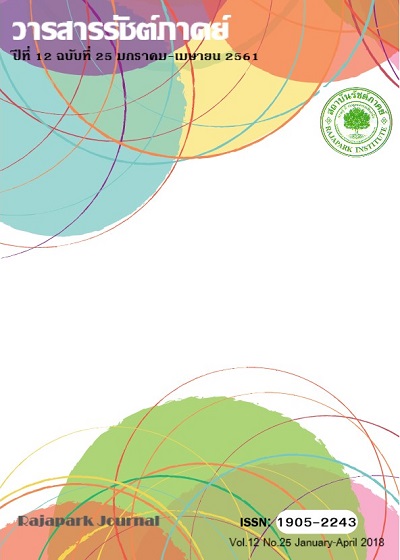Power Interaction: Comparative Operations of Local Government Between hailand and Indonesia
Main Article Content
Abstract
This research is a qualitative research. By research papers have In-depth interviews were provided to 9 Keyinformants. The purpose is to study. Power relations of state, democratic structure, and social identity. This is especially true for local government organizations, especially Bangkok Metropolitan Administration and local government organizations, especially Jakarta. By comparison According to studies, it has been found that The model and the interaction of power in the operation of the local government of Thailand, especially the special local administrative organizations, Bangkok and local government organizations, especially the Indonesian local government. Has a strong relationship with political parties. By recruiting leaders of past organizations, the government is trying to apply the principle of decentralization. Therefore, the recruitment of the leaders of the organization is using direct election methods from the people. The internal structure of the organization is characterized by the use of power from top to bottom, thus giving the governor the highest authority in the organization. It is the goal of political parties and interest groups. To use that influence in favor of their own party in the national election. The same is true of Jakarta's case. National political parties and interest groups. It plays a huge role in the local governing body, because the Jakarta team may be appointed by the governor of Jakarta. The Jakarta governor is seen as a key stepping stone to Indonesia's presidency.
Article Details
Views and opinions appearing in the Journal it is the responsibility of the author of the article, and does not constitute the view and responsibility of the editorial team.
References
โกวิทย์ พวงงาม. (2541). การปกครองท้องถิ่นไทย (พิมพ์ครั้งที่ 6). กรุงเทพมหานคร: วิญญูชน.
ชูศักดิ์ เที่ยงตรง. (2558). การบริหารการปกครองท้องถิ่นเปรียบเทียบ. กรุงเทพมหานคร: มหาวิทยาลัยธรรมศาสตร์.
ชูวงศ์ ฉายะบุตร.(2555). การปกครองท้องถิ่นไทย (พิมพ์ครั้งที่ 3). กรุงเทพมหานคร: งานดี.
ธเนศวร์ เจริญเมือง. (2535). เลือกตั้งผู้ว่าฯ. เชียงใหม่: คณะสังคมศาสตร์ มหาวิทยาลัยเชียงใหม่.
นครินทร์ เมฆไตรรัตน์. (2541). การเมืองในระดับท้องถิ่นกับการพัฒนาการเมืองในระบอบประชาธิปไตย: ศึกษาเปรียบเทียบการเมืองท้องถิ่นของสองนครในเขตภาคเหนือของประเทศไทย. กรุงเทพมหานคร: คณะรัฐศาสตร์ มหาวิทยาลัยธรรมศาสตร์
แผนพัฒนากรุงเทพมหานคร ระยะ 12 ปี (พ.ศ. 2552-2563) กรุงเทพฯ มหานครแห่งความน่าอยู่อย่างยั่งยืน. กรุงเทพมหานคร: สำนักยุทธศาสตร์และประเมินผล.
พัชรี สิโรรส และ ดร. อรทัย ก๊กผล. (2543). การบริหารเมือง: กรุงเทพมหานคร. กรุงเทพมหานคร: คณะรัฐศาสตร์ มหาวิทยาลัยธรรมศาสตร์.
สำนักนโยบายและแผนกรุงเทพมหานคร. (2541). แนะนำกรุงเทพมหานคร 2540. กรุงเทพมหานคร:
สถาบันพระปกเกล้า. (2547). ย้อนอดีต ขีดปัจจุบัน มุ่งสู่อนาคต: ผู้ว่าราชการกรุงเทพมหานคร. กรุงเทพมหานคร: สถาบันพระปกเกล้า.
สำนักงาน ก.พ., (2543). โครงการส่งเสริมการบริหารจัดการที่ดีโดยกระจายอำนาจสู่ท้องถิ่น. วิวัฒนาการ การปกครองท้องถิ่นไทย. กรุงเทพมหานคร:
สำนักสิ่งแวดล้อม. (2550). กรุงเทพมหานครกับงานด้านสิ่งแวดล้อม. กรุงเทพมหานคร: สำนักสิ่งแวดล้อม.
อเนก เหล่าธรรมทัศน์. (2543). วิสัยทัศน์การปกครองท้องถิ่นและแผนการกระจายอำนาจ. กรุงเทพมหานคร: มิติใหม่.
ประวิทย์ ทองภูเบศร์. (2520). การบริหารงานบุคคลของกรุงเทพมหานคร ศึกษาเฉพาะกรณีคณะกรรมการข้าราชการกรุงเทพมหานคร. (วิทยานิพนธ์รัฐศาสตรมหาบัณฑิต, มหาวิทยาลัยธรรมศาสตร์.
อภิชาต สถิตนิรามัย. (2555). รัฐธรรมนูญ การกระจายอำนาจ และการมีส่วนร่วมของประชาชน. กรุงเทพมหานคร: สำนักงานกองทุนสนับสนุนการสร้างเสริมสุขภาพ (สสส.).
อัมพร ธำรงลักษณ์. (2554). การพัฒนานักบริหารระดับอาวุโส: กรณีศึกษากรุงเทพมหานคร. กรุงเทพฯ: คณะรัฐศาสตร์ มหาวิทยาลัยธรรมศาสตร์.

